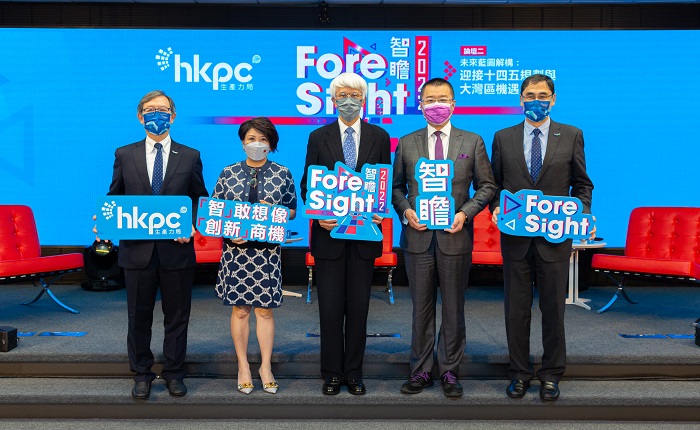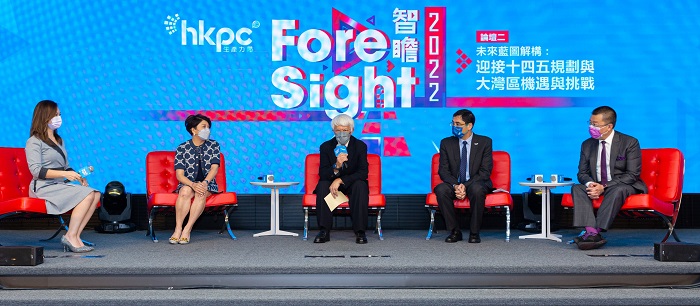HKPC “ForeSight 2022” Second Forum Discusses Opportunities and Challenges of the 14th Five-Year Plan and GBA Leads SMEs to Leverage their Strengths to Explore New Business Opportunities
(Hong Kong, 18 November 2021) The Hong Kong Productivity Council (HKPC) held the second forum of its signature event of the year “ForeSight 2022” this afternoon. Star guest speakers including the Honourable Joseph Yam, Non-official Member of the Executive Council (ExCo) of the HKSAR; Professor Witman Hung, Deputy to the 13th National People Congress (NPC) of the People’s Republic of China and Principal Liaison Officer for Hong Kong of The Shenzhen Qianhai Authority; and Ms Pam Mak, President of the Hong Kong Small and Medium Enterprises Association, joined Mr Mohamed Butt, Executive Director of HKPC, to explore the abundant opportunities and potential challenges from the National 14th Five-Year Plan and the Guangdong-Hong Kong-Macao Greater Bay Area (GBA), analyse Hong Kong’s current and future competitive edge, and study how SMEs can participate in China’s “dual cycle” development strategy and cement Hong Kong’s role as the gateway to the Mainland and international markets.
The construction of the GBA is a major development strategy under the reform and opening up of China in the modern era, carrying great significance to the country's implementation of innovation-driven development and adherence to reform and opening up. The second forum titled “Future Blueprint Analysis: Manage Opportunities and Challenges of 14th Five-Year Plan and Greater Bay Area” deconstructed how SMEs could integrate into the overall development of the country on various fronts, and featured in-depth discussions on the necessary strategic thinking for Hong Kong; policies and opportunities beneficial for collaboration between Hong Kong and Shenzhen collaboration such as the Qianhai Shenzhen-Hong Kong Modern Service Industry Cooperation Zone; development prospects of SMEs; and support for the development of innovation and technology (I&T), etc., with the aim of helping SMEs find business opportunities to open up markets and inject new impetus into the economy.
Mr Mohamed Butt, Executive Director of HKPC, said, “In the new development pattern of China, Hong Kong plays an important role in promoting technological innovation and realising high-end industries. Together with the government’s firm support for the planning of the Northern Metropolis, Hong Kong companies will certainly be able to further integrate into the overall national development and contribute to Hong Kong’s development as an international I&T hub. HKPC has been committed to providing comprehensive support for SMEs with R&D technology, talent development, and financing, assisting Hong Kong in the development of high value-added industries, and complementing with the development of San Tin Technopole, to achieve Hong Kong’s industrial intelligence by leveraging intelligent and comprehensive technology. HKPC understands that not every industry is suitable for development in Hong Kong, so it is actively assisting Hong Kong enterprises to upgrade and transform in the Mainland and the Greater Bay Area. Through our subsidiaries in Shenzhen’s Futian and Dongguan, and the Guangdong-Hong Kong-Macao Greater Bay Area Productivity Promotion Service Alliance, HKPC also builds a bridge of communication between alliance members and SMEs to deepen the exchanges and collaboration in innovative services among Guangdong, Hong Kong and Macao to enhance the overall competitiveness of enterprises in the GBA. At the same time, HKPC is committed to cooperating with the government’s customs clearance roadmap, continues to organise worker exchanges and study missions in GBA and the Mainland, and organises and participates in various technical studies, seminars and exhibitions, etc., striving to promote the exchange of talent in order to expand the R&D talent pool of Hong Kong.”
The Honourable Joseph Yam, Non-official Member of ExCo of the HKSAR, said, “Under the country’s changes over the past century, the 14th Five-Year Plan is particularly forward-looking. In addition to paying attention to the Hong Kong part and the eight centres mentioned, Hong Kong needs strategic thinking to devise what role we can play. The 14th Five-Year Plan has given Hong Kong ample room for imagination to think deeply about how to better integrate into the overall development of our country. In this regard, I have the following three suggestions. First, Hong Kong must establish a strong theoretical basis when formulating policies. For example, the point mentioned in the 14th Five-Year Plan of ‘breaking down institutional obstacles that impede economic circulation and promoting the circulation of factors of production’. Capital is one of the essential elements for production. Hong Kong and the Mainland can create synergies and learn from each other to promote the flow of capital and currency exchange. In addition, Hong Kong must understand the characteristics of the socialist market economy in the Mainland, and better assist in managing risks such as quota management, unit management, project management and regional management. Lastly, the Leading Group for Development of Guangdong-Hong Kong-Macao Greater Bay Area can set up a professional and dedicated financial expert group with exclusive powers to promote the effective implementation of policies to accelerate the integration of Hong Kong into the overall development of the country.”
Professor Witman Hung, Deputy to the 13th NPC of the People’s Republic of China and Principal Liaison Officer for Hong Kong of The Shenzhen Qianhai Authority, said, “2021 marks the beginning of the National 14th Five Year Plan as well as the issuing of more policies supporting the development of the GBA, of which the ‘Qianhai Plan’ catches wide public attention. Hong Kong companies should leverage digital technologies as well as new infrastructure such as AI, Big Data, Cloud computing and 5G to enable their business transformation into intelligent enterprises. Hong Kong companies should foster more university-research-industry collaborations and build stronger competitiveness through innovation and technology.”
Ms Pam Mak, President of the Hong Kong Small and Medium Enterprises Association, said, “Under the effects of the epidemic or the global situation, Hong Kong SMEs are facing many business challenges. However, as China launches a new ‘dual cycle’ development pattern, it is believed that SMEs can use the GBA as the best entry point to grasp the vast business opportunities of the Mainland, open up the domestic market, and at the same time take the opportunity to upgrade and transform. In addition, the government’s gradual opening of customs clearance is expected to immensely help small and medium-sized enterprises to tide over the difficulties and restore the business environment to the pre-epidemic period.”
Covering two days (18 to 19 November 2021), “ForeSight 2022” is held in a forum format under the theme of “Dare to Innovate, Capture the Opportunities”. An ensemble of top political, business and I&T minds and industry leaders is sharing with the audience the upcoming market trends, outlook for I&T development and business opportunities with a forward-looking vision on four hot topics: macroeconomic outlook, challenges and opportunities in the National 14th Five-Year Plan and GBA, reindustrialisation, and strategies on net zero carbon emissions. To recap the second forum, please visit the website: https://foresight2022.hkpc.org.
- Ends -
 The second forum of “ForeSight 2022” was held this afternoon under the theme of “Future Blueprint Analysis: Manage Opportunities and Challenges of 14th Five-Year Plan and Greater Bay Area”. Star guest speakers including the Honourable Joseph Yam, Non-official Member of ExCo of the HKSAR (centre); Professor Witman Hung, Deputy to the 13th NPC of the People’s Republic of China and Principal Liaison Officer for Hong Kong of The Shenzhen Qianhai Authority (second from right); and Ms Pam Mak, President of the Hong Kong Small and Medium Enterprises Association (second from left), joined Mr Willy Lin, Chairman of HKPC (first from left), and Mr Mohamed Butt, Executive Director of HKPC (first from right), for a group photo before the start of the forum.
The second forum of “ForeSight 2022” was held this afternoon under the theme of “Future Blueprint Analysis: Manage Opportunities and Challenges of 14th Five-Year Plan and Greater Bay Area”. Star guest speakers including the Honourable Joseph Yam, Non-official Member of ExCo of the HKSAR (centre); Professor Witman Hung, Deputy to the 13th NPC of the People’s Republic of China and Principal Liaison Officer for Hong Kong of The Shenzhen Qianhai Authority (second from right); and Ms Pam Mak, President of the Hong Kong Small and Medium Enterprises Association (second from left), joined Mr Willy Lin, Chairman of HKPC (first from left), and Mr Mohamed Butt, Executive Director of HKPC (first from right), for a group photo before the start of the forum.
 The Honourable Joseph Yam, Non-official Member of ExCo of the HKSAR (centre); Professor Witman Hung, Deputy to the 13th NPC of the People’s Republic of China and Principal Liaison Officer for Hong Kong of The Shenzhen Qianhai Authority (first from right); Ms Pam Mak, President of the Hong Kong Small and Medium Enterprises Association (second from left); and Mr Mohamed Butt, Executive Director of HKPC (second from right), explored the opportunities and challenges from the National 14th Five-Year Plan and the GBA at the second forum of “ForeSight 2022” together with the forum’s emcee media veteran Miss June Lam.
The Honourable Joseph Yam, Non-official Member of ExCo of the HKSAR (centre); Professor Witman Hung, Deputy to the 13th NPC of the People’s Republic of China and Principal Liaison Officer for Hong Kong of The Shenzhen Qianhai Authority (first from right); Ms Pam Mak, President of the Hong Kong Small and Medium Enterprises Association (second from left); and Mr Mohamed Butt, Executive Director of HKPC (second from right), explored the opportunities and challenges from the National 14th Five-Year Plan and the GBA at the second forum of “ForeSight 2022” together with the forum’s emcee media veteran Miss June Lam.
Share the latest information of HKPC to your inbox

 LANGUAGE
LANGUAGE